#and editted out the actor and put mishima there
Explore tagged Tumblr posts
Note
Mishima shouldn't be singing the ballad of jane doe upside down
Kazumi Mishima shouldn't be singing The Ballad Of Jane Doe, from the musical Ride The Cyclone, while hanging upside down!
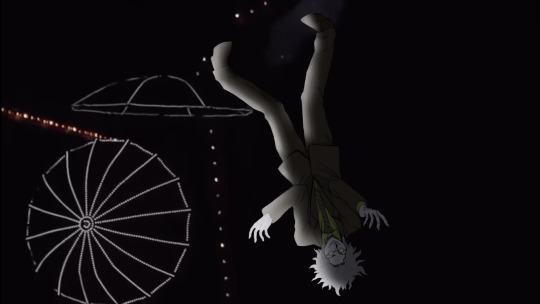
#Mishima In Places He Shouldn't Be#Code Red: Mishima in Impending Danger#i think#your turn to die#yttd#kazumi mishima#i wasnt sure if this is right because i just took a shot from a random youtube video performance#and editted out the actor and put mishima there#so lmk if this is correct or not#ride the cyclone#the ballad of jane doe#rtc
27 notes
·
View notes
Text

Yuzo Kayama and Yoko Tsukasa in Scattered Clouds (Mikio Naruse, 1967)
Cast: Yoko Tsukasa, Yuzo Kayama, Mitsuko Kusabue, Mitsuko Mori, Mie Hama, Daisuke Kato, Yoshio Tsuchiya, Yu Fujiki, Tadao Nakamura. Screenplay: Nobuo Yamada. Cinematography: Yuzuru Aizawa. Production design: Satoru Chuko. Film editing: Eiji Ooi. Music: Toru Takemitsu.
As Scattered Clouds opens, Yumiko Eda (Yoko Tsukasa) is as happy as a married woman can be: Her husband has just had a promotion that will take them from Tokyo to Washington, D.C., and she has just learned that she's pregnant. And then he's killed in an accident and she loses the child. It's a mark of Mikio Naruse's masterly control of tone that he chooses neither to show the accident happening or to make explicit how her pregnancy ended -- whether it was a miscarriage or an abortion. The cause is less important than the effect: Yumiko's utter devastation. And then we switch from her point of view to learn that the driver who killed her husband, Shiro Mishima (Yuzo Kayama), was devastated by the accident in his own way. Although he is exonerated -- he was in no way responsible for the death of Yumiko's husband, the result of a blown-out tire that caused him to lose control of the car -- he suffers at work: His company wants to avoid scandal and transfers him to a less-desirable location. He also suffers from guilt: Desperate to make amends, he arranges to send Yumiko a monthly stipend. She needs the money: Her husband's family coldly distances itself from her, and the insurance isn't enough to live on. But she proudly rejects Shiro's offer, regarding it as "blood money," until it's apparent that she needs it to survive. To that point, Scattered Clouds is a probing look at the nature of grief and guilt. And then melodrama sets in: Shiro's transfer coincidentally puts him in the neighborhood of the inn that Yumiko's sister-in-law runs, and Yumiko takes a job as hostess at the inn. As their plot-crossed paths intersect, Shiro and Yumiko overcome their initial antipathy and fall in love. But what matters in Scattered Clouds is not the familiarity of the tropes of melodrama but the skill with which Naruse, his actors, and his crew -- especially composer Toru Takemitsu -- handle them. It's an irresistible film, no matter how contrived its plot, and if you're not a little teary-eyed when it ends, I feel sorry for you.
1 note
·
View note
Text
Great article about Paul Schrader’s The Card Counter - a poker movie that’s not really a poker movie...
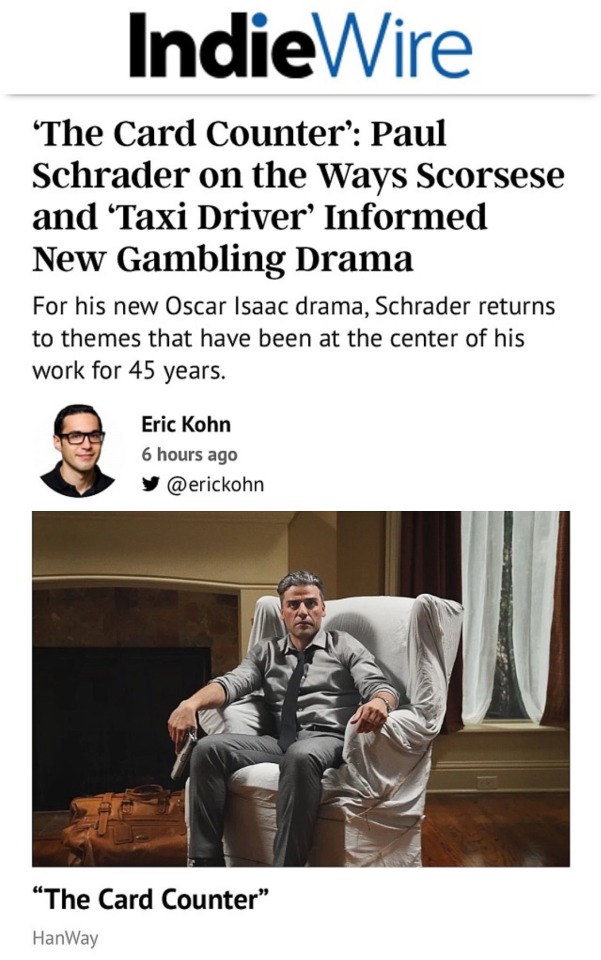
Some filmmakers write a hit movie and spend the ensuing years trying to escape its shadow. Paul Schrader never flinched. Forty-five years after his “Taxi Driver” script put him on the map, the writer-director has developed a body of work loaded with alienated anti-heroes compelled to violent and reckless extremes for the sake of a higher calling.
That includes “The Card Counter,” in which Oscar Isaac plays guilt-stricken Abu Ghraib vet William Tell, a man with a gambling addiction compelled to help the revenge-seeking son (Tye Sheridan) of a former colleague. Taking justice into his own hands, Isaac’s William Tell slithers through the Vegas strip in search of questionable salvation, not unlike a certain Vietnam vet named Travis Bickle did from the driver’s seat. As if to cement the comparisons, “The Card Counter” features Martin Scorsese as an executive producer, marking the first time the two men share a credit since 1999’s “Bringing Out the Dead.”
For Schrader, “Taxi Driver” comparisons are inevitable in all his work. “My tendency is to look for interesting occupational metaphors,” Schrader said in a recent interview. “‘Taxi Driver’ hit the bull’s eye of the zeitgeist and it doesn’t die. There’s no way I could’ve planned for that, but it does inform the stories I tell.”
At 75, Schrader continues to churn out movies much like his compatriot Scorsese, albeit on a much smaller scale. “The Card Counter” is the latest illustration of the secularized Christian dogma percolating through his work. “Our society doesn’t like to take responsibility for anything,” he said. “But I come from a culture where you’re responsible for everything. You come into the world soaked with guilt and you just get guiltier.” In his own prickly fashion, Schrader makes movies steeped in empathy for lost souls in search of redemption despite the daunting odds. “We’re all certainly capable of forgiveness,” he said, and chuckled. “Anyone who says otherwise is wrong.”
The “Taxi Driver” dilemma looms large in nearly all of Schrader’s work, from the dazzling high-stakes activism of “Mishima: A Life in Four Chapters” all the way through Ethan Hawke’s eco-conscious priest in “First Reformed.” While the latter, Oscar-nominated effort brought Schrader new fans, “The Card Counter” is an even more precise distillation of his aesthetic — a moody, philosophical drama about the vanity of the personal crusade.
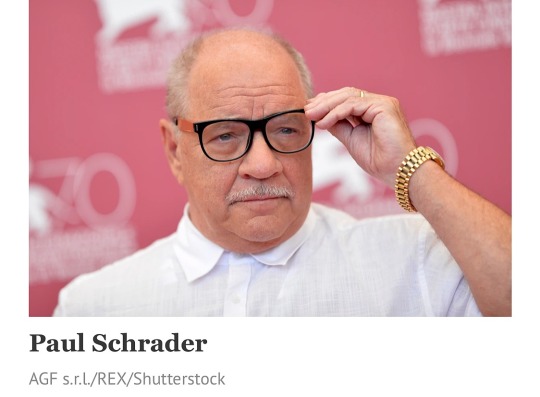
Schrader, who has labeled his homegrown character studies as “man in the room” dramas, embraces the parallels as usual. “There is this kind of myth that the taxi driver was this friendly, joking kind of guy who was a character actor in movies,” he said. “But the reality is that it’s a very lonely job, and you’re trapped in a box for 60 hours a week.” He saw the same logic with gambling, a wayward profession generally depicted in the movies in the context of escapist romps, rather than the somber rituals that afflict most players. “I thought about the essence of playing cards every day, or sitting in front of a slot machine. It’s kind of zombie-like,” Schrader said. “You see commercials of people in casinos laughing. But it’s a pretty glum place. Today with slots you don’t even have to pull the lever. You just sit there and let the numbers roll.”
The gambling figure led Schrader to the bigger picture of his character’s conundrum. “I was wondering why someone would choose to live in that sort of purgatory,” he said. “He doesn’t want to be alive, but he can’t really be dead, either. What could cause that? It can’t be a simple crime, murder, or a family dispute. It has to be something unforgivable. And that was Abu Ghraib.”
After the fallout of that debacle, William did time in a military prison, and reenters society before the movie begins. That was a world the filmmaker wanted to understand in clearer terms. Though Schrader has received blowback for his controversial Facebook posts in the past, in this case, the platform was an asset: He used it to track down soldiers who had done time in the United States Penitentiary in Leavenworth, the only military prison in the U.S., to better understand the initial claustrophobic world that Tell endures, as well as the conflict between the justice he’s received and what he deserves. “This man has been punished by his government, set free, and paid his due, but he doesn’t feel that,” Schrader said. “What does he do then? How does he fill his time? That’s how it all began.”
Schrader himself toyed with gambling when he lived in Los Angeles early in his career, but soon gave it up. “I very quickly realized I was only interested in gambling if it was really dangerous and I didn’t want to expose myself to that kind of danger,” he said. Years later, though, the experience helped inform his story. “There is this whole fantasy of gambling movies from ‘The Cincinnati Kid’ to ‘California Split,’” Schrader said. “But poker is all about waiting. People will play 10 to 12 hours a day and two to three times a day, a hand will happen where two players both have chips. Now you’ve got a face-off. But that doesn’t happen very often. Most guys who are there are running the numbers, the probability.”
He envisioned “The Card Counter” as a repudiation of the traditional poker movie, which builds to the giddy release of a final tournament. When that moment arrives in the movie, Schrader takes the movie in a bleak, shocking new direction. “It’s not really a poker movie — that’s a red herring,” he said.
William is immersed in his casino journey when he encounters Cirk (Sheridan), the crazy-eyed son of another Abu Ghraib soldier who committed suicide. Cirk blames the soldiers’ former commander (Willem Dafoe), and hopes to loop William into the plan. Instead, the older man decides to take Cirk under his wing to talk him out of the act, which doesn’t prove so easy. In the process, the gambler forms a curious bond with La Linda (Tiffany Haddish), a gambling agent and pimp whose icy, relentless drive to make the most out of the poker circuit brings William some measure of companionship on his wayward journey.
youtube
It should come as no surprise that the “Girls Trip” breakout is nearly unrecognizable in the role of the calculated La Linda, which is also a distinctly Schraderish touch: From his work with Richard Pryor in 1978’s “Blue Collar” all the way through Cedric the Entertainer’s supporting turn in “First Reformed,” Schrader has made a habit of seeking out comedic actors willing to play against type. That’s partly opportunistic on his part. “They’re eager to do it because they want to expand their palette, so you can get them for a price,” Schrader said, chuckling again. “That’s necessary, given the kind of films I make.” But that’s not all: “They will always find a way to be interesting, even when they’re not getting a laugh.”
Which is not to say that the process comes easily to them. Haddish recently told the New York Times that Schrader had to coach her out of speaking in a comedic sing-song. The filmmaker put it in blunter terms. “On the first reading of the script we had, frankly, she wasn’t very good,” he said. “I told her to go back and read every single line without emotion. Then I said, ‘You’re not going to do that in front of the camera, but you can’t hit every line either. So let’s pick five or six lines you can hit where you get a smile or reaction.’ Quickly she got that it was a different rhythm.”
As for Isaac, whose disquieting turn suggests a maniac lingering just beneath the surface, Schrader once again turned to metaphor. “I told him to imagine himself on a rocky coast in the ocean,” Schrader said. “Waves are going to come up and get you all day every day. They’re going to try to batter you. Let them. The waves will go away. You’ll still be there. Don’t compete. In the end, the rocks will win. You have to learn to trust that the way these things are put together has more power than the individual movement.”
William’s routine includes an odd ritual in which he covers all the furniture in his various Vegas hotel rooms with white paper. While the motivation is never explained, Schrader said it stemmed from an experience with production designer Ferdinando Scarfiotti on the set of 1982’s “Cat People,” when Schrader realized the man was doing the same thing. “He said, quite simply, ‘I have to live here surrounded by these ugly hotel furnishings,’” Schrader recalled. The concept inspired the new movie’s most compelling visual motif. “Casinos are very ugly places. There are no exceptions,” Schrader said. “Often you aspire to finding pockets of beauty and there weren’t really any here except the only place he could control, which was his hotel rooms, where he could privatize his visions. I came up with this ritual for him to control those visuals.”
At a certain point, Schrader himself couldn’t control the visuals of “The Card Counter” for more prosaic reasons: After an extra tested positive for COVID-19, the production shut down last March, with five days of shooting left, and couldn’t resume until July. Though Schrader initially took to Facebook to fume at his producers, the pause eventually opened up an opportunity to tweak his vision. “I edited the film and put in placeholders for the five or six scenes of consequence that I hadn’t shot,” he said. “I didn’t have a fully finished film but I could screen it for people. Normally you only get that privilege if you have a big-budget film and you’re allowed reshoots.” The early audience included Scorsese, who provided a crucial note. “I asked Marty, ‘What am I missing?’ He said to me that the relationship with Tiffany and Oscar was too thin. So I rewrote those scenes.”
Schrader asked Scorsese to take on the executive producer credit as a favor. “I said, ‘Marty, wouldn’t it be nice to share a card again? I thought it would help sell the film but it would also be a cool thing to do after all these years,’” Schrader said. “Then a couple of weeks later his agent called wanting to work out a deal. What deal? I asked Marty and he said yes. That’s the deal!” Now, the pair are trying to collaborate on a new long-form TV series based on the Bible, though the timing has been delayed by production on Scorsese’s upcoming “Killers of the Flower Moon.”
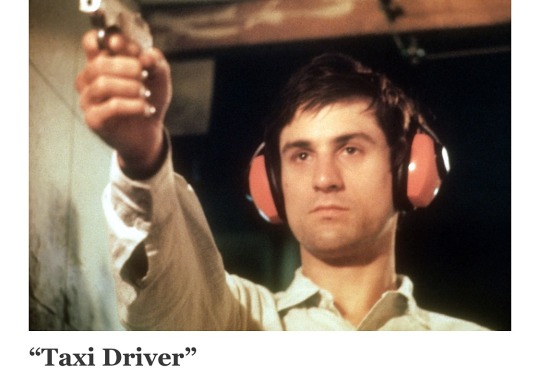
In the meantime, Schrader has been mulling over the way “Taxi Driver” not only continues to inform his storytelling but the world at large. “Hardly a week goes by that I don’t notice or hear some reference to it,” he said. “But I don’t know how you’d tell such a story today. A number of writers have tried and I don’t think they’ve succeeded because it has to come out of a certain place and time. We have plenty of these incels around, but they’re not as original or revealing as they were 45 years ago when that character came on the scene. I wouldn’t know how to write about it.”
Instead, his next project is a love triangle called “Master Gardener,” which he hopes to shoot in Louisiana before the end of the year. He has several other potential scripts ready to go after that. And while he has expressed trepidation about the future of cinema in the past, he’s not convinced that audiences have given up on it yet. He recalled a conversation he had with Cedric the Entertainer when “First Reformed” made the rounds. “He said off-handedly to me, ‘You know, I didn’t realize there were so many people who liked serious movies,’” Schrader said, and chuckled once more. “Well, yeah, there are.”
“The Card Counter” premieres next week at the Venice Film Festival. Focus Features releases on September 10, 2021.
###
#oscar isaac#the card counter#paul schrader#martin scorsese#tiffany haddish#tye sheridan#willem dafoe#taxi driver#master gardener#indiewire
35 notes
·
View notes
Text
Pond Interview: Wonderment in a Static World

Photo by Matsu
BY JORDAN MAINZER
On their latest album 9, Perth psychedelic rock band Pond wanted to dive into something new, both instrumentally and lyrically. With a mixture of warped improvised sonics and songs about individual characters real and fake, they’ve created the purest distillation of frontman Nick Allbrook’s fever dream dichotomies. Only he could mention a sexualized Winnie the Pooh on the same album as songs about toxic masculinity, all the while dedicating entire songs to abstract artists he loves like Agnes Martin. The post-improv session compositions are equally contrasting, the snap funk of “America’s Cup” followed by the buzzing, reflective, sad ballad “Take Me Avalon I’m Young”, and then the disco punk of “Pink Lunettes”. Yes, there are times when the mood of the song’s themes seem like all-too-perfect fits with the timbre of the music: the synaptic techno and squalling feedback that soundtracks Allbrook’s sex drive on “Human Touch”, the atonal Afropop guitars that flourish during “Rambo”’s chiding of Eurocentrism. For the most part, 9 is anything but the 9th straightforward Pond album that you’ve heard before. It’s one that manages to look outward and inward with peak sardonic wit and genuine melancholy, celebrating what’s good nonetheless.
I spoke to Allbrook over the phone from Hastings, UK a couple months ago. Read our conversation below, edited for length and clarity.

Since I Left You: You wanted to write about more specific lives on 9. Was that decision influenced by anything going on in your life or the world?
Nicholas Allbrook: I’m not sure, actually. I think a lot of different things. I suffered a severe sort of burnout in general, just from the great heaviness of everything. I really felt like to actually be excited about writing, I needed to find something that wasn’t so terrifying and saddening, so I started zooming in a bit more on the minutiae of life. Things I had a teenage excitement about. Things I could describe in great personal detail. Songs about Agnes Martin. “Czech Locomotive” is about Emil Zátopek. There’s another song about Yukio Mishima. They’re sort of my 32-year-old version of writing your favorite actor’s name on your schoolbook. What you’re really into. [laughs]
The interesting thing is in writing about a long-distance runner from the 50′s that I was stoked on at the time, or writing about my favorite slippers, or fig season, every time they sort of led back into writing about something a bit weightier.
SILY: In a sense, a lot of these songs, you’re pining for human connection, even if it’s a sleazy one like on “Human Touch”.
NA: For sure. And magic, as well. A childish excitement. In “Take Me Avalon”, a lot of it is about how as you get older, [things like] teddy bears move from being friends and confidants to junk. People in costumes just become people in costumes. A lot of the album is about reaching for some sort of wonderment in a very broken, static monochromatic world.
SILY: On “America’s Cub” and “Rambo”, you tackle toxic masculinity and people’s pretentiousness, or putting on a persona of something they’re not. Was that something you were really thinking about on the record as a whole?
NA: Occasionally, yeah. I think I let myself get a bit more grumpy, be a bit more of a curmudgeon. It's also funny stuff, and I find pettiness in myself pretty hilarious. I was just letting myself be petty, having a laugh, not making any bones about the sort of saintly virtue of the writer. I’m just an aging grump. [laughs]
SILY: Do you have a favorite quip on the album? It’s full of quotable lines.
NA: I’m pretty into “She was talking at the speed of ice / As I emptied the organic waste / She was jacking a car but she seemed quite nice / So I let her use the toilet in my place.” I feel like toilet is an underused word in pop music. On the last album, I thought I was the first person to use “penis” in pop music, but turns out Young Thug beat me to it.
SILY: He’s revolutionary in a lot of different ways.
NA: And what better than saying “penis?” It’s not sexy, it’s not mean, it’s just penis.
SILY: The song “Toast” captures these multiple tones in one song you’re alluding to. You’re talking about deeper, more serious issues like brushfires and climate change inequality but also being a bit tongue in cheek, with a “Fuck it: let’s be together” attitude. Do you approach your songwriting with multiple layers in mind?
NA: It’s not so much in mind; that’s what’s in me, and I guess in everyone. Even in writing the lyrics to that song...You’re right. That’s why it’s really hard to explain the concept of lyrics to people. This is in every song I’ve ever written. Part of it is this grumpy guy poking fun at tourists, but also real fear and anxiety about bushfires and climate change. I’m also laughing at my own ignorance and my own hopelessness and uselessness and privilege, as well. When I say, “Let’s toast,” I’m talking about “them,” the people watching the stairway to heaven, the earth being toasted, us enjoying ourselves while it lasts, and also the ridiculousness of enjoying ourselves while it lasts.
SILY: Do you feel guilt about enjoying yourself while it lasts?
NA: Of course, yeah. I think at this point it really gets to that thing where I can’t explain it. I think that’s why a lot of people don’t like to explain lyrics. I try to, but I think this is why: There are so many different sort of feelings that go into it and around it.
SILY: 9 is obviously your 9th record, but is there something specifically encapsulating of this record about POND that you chose the number for the title?
NA: We’re pretty into no-wave kind of stuff, and ESG, and krautrock like Can, and more industrial Reznor. It just sort of matched the black-and-white hiss of it. I don’t know! We couldn’t think of anything better!
SILY: Anything you’ve been listening to, watching, or reading lately that’s caught your attention?
NA: I just finished reading How Do You Live? by Yoshino Genzaburō. It was fucking awesome. Really cool. I’ve been listening to pretty fist-pumping stuff, like Springsteen and The Waterboys. Believe it or not, 80′s Oz rock, like Icehouse, The Angels, the Divinyls. Some new stuff I’ve been liking: I really like this song “Spaceship” by Youngn Lipz, this Sydney artist. [It] has the most magnificent soaring chorus I’ve ever heard. It fucking rocks.
youtube
#interviews#pond#spinning top music#9#matsu#nick allbrook#winnie the pooh#agnes martin#emil zátopek#yukio mishima#rambo#esg#can#trent reznor#how do you live?#Yoshino Genzaburō#bruce springsteen#the waterboys#icehouse#the angels#divinyls#youngn lipz
3 notes
·
View notes
Photo









International co-productions in the Corona Disasters are a real challenge. Most of our projects have been put on hold, including a production with the Beijing-based children's theatre company, Qfun Theater, which was scheduled for early last year in Yokohama and several cities in China, and a collaborative project with W!LD RICE based in Singapore, which we have been preparing for several years. In the midst of all this, the long-term international co-production project with Indonesia is the only one that, due to a variety of circumstances, we started last year in 2020 somehow and have been continuing this year. We have been running the project for a long time while we've been exploring. As for what we are doing specifically, we are currently doing 2-3 hours of online meetings/remote creation work every other Saturday in preparation for my visit to Indonesia in September 2021 (I am not sure if that will ever happen either...) for a joint workshop and residency in Jakarta. There is a two-hour time difference between Tokyo and Jakarta, so we coordinate our meetings from 8 p.m. in Jakarta and 10 p.m. in Japan, so it is often around 1 a.m. in Japan when the meeting is over. Nevertheless, my team members all take time out of their busy schedules to participate in the creations without complaining. I cannot thank them enough. Last month, I asked all actors to choose 1-3 lines from each of the two texts we are working on, "Rintrik" by Danalto and "Sotoba Komachi" by Yukio Mishima, those they are interested in, or they are inspired, for the preparation of our collaboration work, I mean, because we two theater company will use the two texts to create a piece of work in the future. And then, I asked the actors to read the lines in their own language and in the language of the counter country, and to give a presentation on why they had chosen the lines they did. The Q&A and discussions that followed were particularly useful and deepened our understanding of the two texts, as well as the differences and similarities between the religious, cultural and linguistic contexts of the two countries. This month, at my suggestion, I asked them to shoot a 60 second video for each of the following motive: "I don't know what I'm waiting for, but I'm waiting for something." I also asked to shoot the video of the following situations.: The conditions were that the actors their selves had to be in the video and that they had to submit lines excerpt from one or two of the two texts that also resonated with the situation. Again, each actor's sense of style and personality came through clearly, and we got some interesting images. As a record of the process, we are planning to edit the 60-second videos of all the actors, with the lines as subtitles, and make them into one of our project-process archive videos. Sure, of course, there are many things we cannot do because we are far away. Yeah. But YES, let us use that to our advantage and find out what we can do for now. I have never met any of the Indonesian actors, but each and every one of them is special to me, and already they are inspiring me to create. Our next online meeting is this weekend. Every fortnight is a long time, but a short time. Anyway, we are trying hard to spend some quality time with my team and team in Jakarta, before our next "real" "face-to-face" meeting. コロナ禍中での国際共同制作というのは、本当に難しい。じっさい、shelfというか矢野の抱えていたプロジェクトで、昨年初頭に中国で予定されていた北京を拠点にする児童劇団Qfun Theaterとのプロダクション、数年前から準備して来ていたシンガポールのW!LD RICEとの協働プロジェクトなど、ほとんどのプロジェクトが今、中座している。 そんな中、インドネシアとの長期国際共同制作プロジェクトだけは、様々な事情が絡まって、昨年2020年から見切りで走り始めて、今年もずっと継続している。手探りをしながらずっとプロジェクトを走らせ続けている。 具体的にどんなことをやっているのかというと、今は、2021年9月にインドネシアに渡航して、(それも実現するかどうか定かではないのだが、)ジャカルタで合同ワークショップ、滞在制作をするために、その準備として、隔週土曜日に2-3時間のオンラインミーティング/リモートでのクリエイションワークを行っている。 東京とジャカルタとの間には時差が2時間あるので、双方の都合を調整して、ジャカルタの午後8時から、日本時間の午後10時からミーティング行っているので、日本側ではミーティングが終了すると午前1時を回っていることも多い。 それでもみんな文句を言わず忙しい時間の合間を縫ってクリエイションに参加してくれている。感謝しかない。 先月は、俳優に今回題材としている二作品、ダナルトの『Rintrik』と三島由紀夫の『卒塔婆小町』から自分が気になる、あるいは二つのテキストからインスパイアされて将来、1つの作品を作ることを想定して、それぞれのテキストから1-3行ずつ抜粋して貰って、それを選んだ俳優がそれぞれ母国語で読み、相手の国の言葉でも相手国の俳優に読んでもらい、何故その台詞を選んだのかについてプレゼンテーションを俳優にして貰った。 その後のQ&Aやディスカッションは非常に有意義で、二つのテキストに対する理解が深まっただけでなく、両国の宗教的、文化的あるいは言語的文脈の違いや共通点などを深く掘り下げることが出来た。 今月は、僕の提案で「何を待っているか分からないが、何かを待っている。」という状況をモチーフに、それぞれ60秒の映像を撮影して貰った。 条件としては、自分がその映像に移り込んでいることと、例の二つのテキストから、同じくその状況と響きあう台詞を抜粋して、提出して貰った。これもまた、俳優それぞれのセンス、個性がクリアに現れていて、とても面白い映像ばかりが出そろった。 これについては、プロセスの記録として、全員分の60秒動画を台詞を字幕として入れて編集して、1本の映像作品にしようと思っている。 離れているから、そりゃ、出来ないことはたくさんあるさ。だけどそれを逆手に、出来ることを探そう。じっさい一度も会っていないインドネシアの俳優たちが、その一人ひとりが僕には今、とても愛おしく、且つ、創作意欲を刺激する特別な存在だ。 次のオンラインミーティングは今週末。二週間に一度というのは長いようで短い。とにもかくにも、次に本当に対面で会うときまでに、充実した時間を作って、過ごそうと思う。
#Crossing text: International collaboration project between Tokyo and Jakarta#三島由紀夫#Danarto#international#collaboration#co-production#kejawen#Isram#buddism#theatre#creation#play#drama#Rintrik#国際共同制作#スーフィズム#イスラム教#仏教#神道
0 notes
Text
This is a great article about how The Card Counter managed to finish principal photography after getting shut down mid-March due to COVID-19.
Also, it includes this interesting description from Paul Schrader about Oscar Isaac’s character, William Tell -- “So now I have a character and he’s in his room, he’s alone. And he has a mask on. And the mask he wears is a professional poker player. And the problem that runs alongside him is that he is a former torturer for the U.S. government. So it’s a mix of the World Series of Poker and Abu Ghraib.”
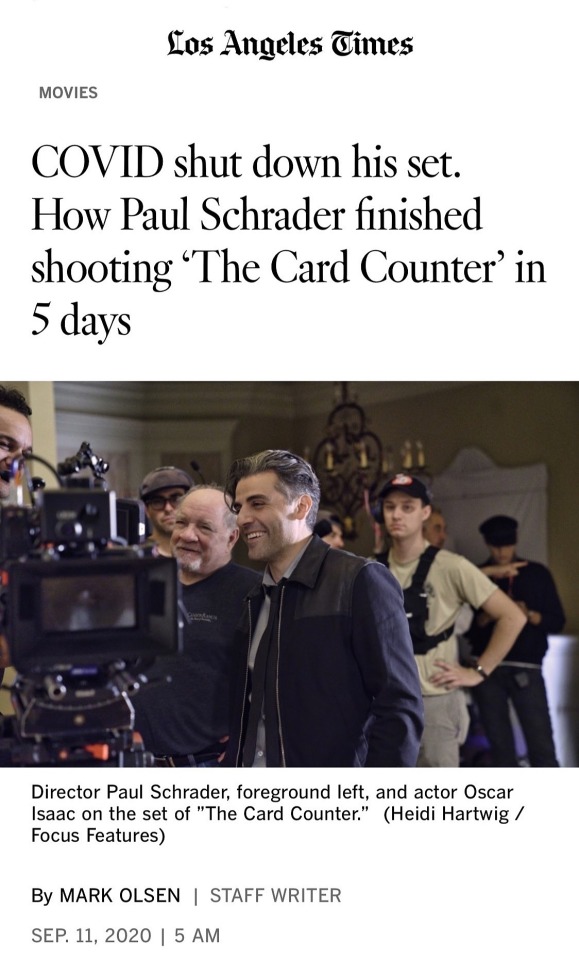
Having somehow weathered his way from enfant terrible to wizened survivor, Paul Schrader is a filmmaker who is simply not finished yet. Every time it might seem his career is on the wane, he resets, revitalizes and comes back again.
Just a few years after his 2014 film “Dying of the Light” starring Nicolas Cage was taken away from him by financiers — leading Schrader to disavow the movie — he received his first Oscar nomination (for original screenplay) after directing “First Reformed,” which was released in 2018 and starred Ethan Hawke as a troubled small-town minister.
Schrader’s work is marked by emotional intensity, intellectual vitality and an aesthete’s appreciation of style. His filmography is full of unusual corners that are still being discovered. The 1979 film “Old Boyfriends,” directed by Joan Tewkesbury with a screenplay by Schrader and his brother Leonard, was recently rereleased on home video. As was the 1990 film “The Comfort of Strangers,” directed by Schrader from a screenplay by Harold Pinter.
He’s been directing films from his own scripts since 1978’s “Blue Collar” starring Richard Pryor, Harvey Keitel and Yaphet Kotto. He went on to write and direct such films as “Hardcore,” “American Gigolo,” “Mishima: A Life in Four Chapters,” “Light Sleeper” and “Affliction.” His celebrated work as a screenwriter for director Martin Scorsese includes “Taxi Driver,” “Raging Bull,” “The Last Temptation of Christ” and “Bringing Out the Dead.”
Never one to shy from controversy onscreen or off, he directed Lindsay Lohan in the 2013 Hollywood-set thriller “The Canyons,” written by Bret Easton Ellis.
In March, Schrader was about three-quarters through the shoot for his next film, “The Card Counter,” in Mississippi — with a cast that includes Oscar Isaac, Tiffany Haddish, Tye Sheridan and Willem Dafoe — when the production was shut down due to the growing pandemic. In July, Schrader was able to shoot for an additional five days to complete production.
During the break in shooting, “The Card Counter” was picked up for distribution by Focus Features.
Schrader recently got on the phone to talk about the unusual circumstances of the film’s production and completion. A film critic before he became a filmmaker, Schrader not only had startling insights into his work, but also thoughts about what filmmaking and exhibition might be like in a post-COVID world.
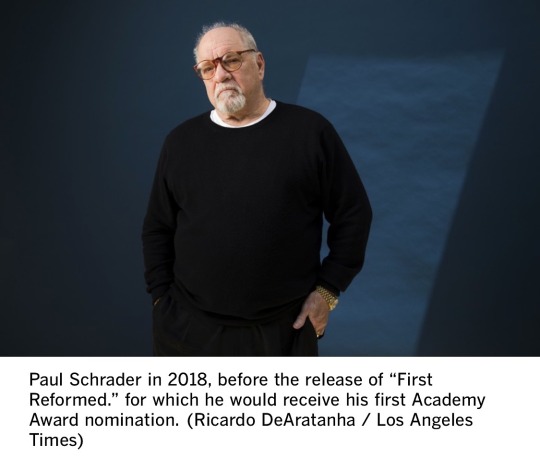
Before we start talking about the production on the movie, could you just describe the story? What is “The Card Counter” about?
Well, I don’t want to get too deeply involved in the plot, but what I will say is over the years I’ve kind of developed my own little genre of films. And they usually involve a man alone in a room, wearing a mask, and the mask is his occupation. So it could be a taxi driver, a drug dealer, a gigolo, a reverend, whatever. And I take that character and run it alongside a larger problem, personal or social. It could be debilitating loneliness like in “Taxi Driver.” It could be a midlife crisis like in “Light Sleeper.” It could be an environmental crisis like in “First Reformed.”
So now I have a character and he’s in his room, he’s alone. And he has a mask on. And the mask he wears is a professional poker player. And the problem that runs alongside him is that he is a former torturer for the U.S. government. So it’s a mix of the World Series of Poker and Abu Ghraib.

How did you come to put those two things together?
I’m always looking for that. I’m looking for deep-seated problems, either personal or societal, and some kind of oddball metaphor. The more you get closer, you run these two wires next to each other, the more sparks you see flying across. And it’s in the sparks that the viewer comes alive. If the wires ever touch, there’s nothing left for the viewer to do. But if you keep these two wires really close to each other, the viewer will start to spark from one wire to the other. And that’s the greatest thing you can give a viewer or a reader, an opportunity to be part of the creation.
Let’s talk about the production and everything you’ve been through. Take me back to March. What was it like for you when the production had to shut down?
I have learned in my dotage how to make a quality film on a low budget. So the film I used to make in 40 days I now make in 20. And so “First Reformed” was 20. I had shot in Biloxi 15 days. Now I knew coronavirus was going to be rising, because when I heard that Macau shut down, I said, you know, it’s just a matter of time. Macau is the wealthiest gambling center in the world and I’m here in the gambling center of the Gulf. If Macau shuts down, it’ll reach Vegas, it’ll reach here. And we were doing a scene, a poker tournament with 500 extras. And I remember I said to the A.D., “We can’t put 500 people in a room without one of them being positive.” And sure enough, one of them was. Two days later, we not only closed down, all of the Gulf was closed down.
Fortunately, when I went back, I had shot my big crowd scenes. And also I had shot my sex scenes, which I would have hated to try to do under these restrictions. So all I had left when I went back was a number of scenes in the prisons, and four more scenes in the casinos, some driving scenes. So I was in pretty good shape. But I really wanted to finish the film.
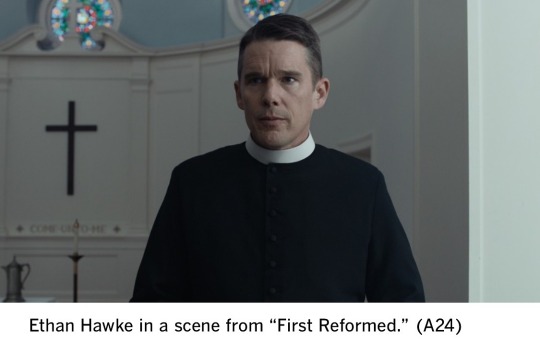
And Oscar Isaac, he was on his way to Hungary to do reshoots for “Dune.” And he wanted to put off this reshoot till after “Dune” — to do it in September because he has a big beard and he didn’t want to shave off his beard. I said to him, “Oscar, there’s a window open right now in Mississippi.” I said, “If we don’t jump into this window while it’s open, this will become one of those famous films that never got finished, and we’ve got to exploit this moment.”
So I talked him off the ledge and he agreed to do it. And we were able to put everybody back together and do our week of prep and five days of shooting. It was very strange, and in a way it was kind of fun, in a summer camp sort of way. But I would hate, hate to make a whole film this way. It was an adventure for five days, it’s a nightmare for five weeks.

In the break from March to July, were you on high alert that you could come back at any moment? Were you editing the footage you already had?
Here’s what happened. I was editing. My editor is in New Jersey and my assistant editor is in Tennessee, so we’re all editing virtually. And I had four major dialogue scenes between my principal characters that I had not shot. Then I was able to screen virtually the film for a number of people I respect, like Scorsese, who is the executive producer, like [filmmaker and programmer] Kent Jones and other people. And what I asked them all is, “I have four more scenes to shoot. I can rewrite them. What am I missing? What do I need to add? How should I write these four scenes?”
And I started getting feedback about what they felt was missing. So I was able to rewrite these scenes and make these relationships much better. And not all productions get to do that. It’s a very expensive reshoot, but it was built-in that three-quarters of the way through, I have an opportunity to rewrite one-quarter of the meaningful character scenes. So I did, I rewrote it. And I realized what was missing. And I wouldn’t have realized that if I was shooting at the top. I would have only realized that in post. And I would have walked around the room kicking myself in the ass, saying, “I wish I had the opportunity to reshoot some scenes.”
How was getting everything back together?
As soon as Mississippi allowed us to come back, we came back. And of course nobody’s working, so everybody’s eager to come back. They are hyper-conscientious because they know they are only being allowed to work by the grace of God. And so the masks and the PPE and the hands and the distancing, you don’t need to tell any of the people this. They’re so happy to be at work. They have no problem with any of that.
You can only have one person within six feet of your actor at a time. That person could be hair, it could be makeup, it could be props, it can be the director, it could be another actor. And you kind of queue up. And a thing that I realized, we had a warehouse. So we did rehearsals for every scene in this warehouse. And I told the actors that when we get to the location, to the casino, the prop people will be in there, the lighting people will be there and then you will walk there with your mask on, and you will take the positions that you took in rehearsal. Then I will roll camera and you will take your masks off and we’ll play the scenes. So that’s how we did it.
Given everything that it takes to get to shooting, once you were back on set with the actors, did you still feel like they could give you the performances that you needed? Was it difficult to get to a place of artistic creation given all the other concerns that everyone has?
Because they had done the rehearsals, they had gone through the permutations of their performances before. So the only thing different for them was that they were in a real space rather than a fake space. As I explained to them, there would be no time for exploration on set. All the exploration you are going to do, we’re going to do here in the warehouse. I don’t want to hear one peep from you about changing anything once we get into this hothouse environment. So however many hours we have to spend in the warehouse, let’s spend it.
How close to finished are you with the movie now, considering you had a lot of it already cut together?
Basically, I’m finished, down to an hour and 49 minutes, which is where I think it should be. Obviously, I have to do the score, there’s the post-prod and the special effects, but the thing is that there’s no pressure to finish the film anymore at this time. I was talking to Focus, and I could give them the film in a month. They don’t want the film in a month because they don’t know what to do with it in a month. They said, you just take whatever time you need, which is the opposite of the way studios usually talk. I also have final cut, so it doesn’t really matter. What I deliver, I deliver.
When you made “The Canyons” you talked a lot about your feelings regarding the theatrical experience, VOD and streaming and contemporary filmmaking. What impact do you think the COVID shutdowns will have on movie theaters?
There’s a certain kind of film like “The Canyons,” which should be made for VOD, which is a kind of exploitation film. And there’s another kind of film like “First Reformed” that has to be mounted by film festivals and art-house cinemas, so that it has an identity prior to VOD. So if you’re on VOD and you see an Ethan Hawke film about a minister, you’re not going to say, “Oh, let’s watch that.” No, what you’re going to say is, “Oh, I heard about that film. I heard it was good.” Well, how did they hear it was good? They heard that from film festival reportage and they heard from their friends who have seen it at theaters. So that sets up VOD.
The opposite case is a film like “First Cow,” a film that was crushed by not having a theatrical window. And everybody is, “Should I watch ‘First Cow’?” They have no context. So what’s important for a film like “The Card Counter” is we have to give it context. We have to go to the festivals and we have to go to the art cinemas to tell people what we have in our hands. Then we can go to VOD, where the real money is. So “First Reformed” went to Telluride, Toronto, Venice and New York. That set the table. I would love to set the table for this one. I can go to all those festivals. That’s not a problem for me anymore. The problem is: Are festivals going to happen?
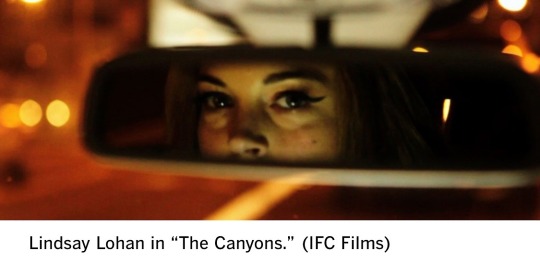
Do you think theaters are going to come back?
Not in the way they did. There are only four reasons for theaters to exist anymore. And this situation has accelerated these trends. Like symphonies and operas and live theater, concerts, they need a reason to exist. One reason is family cinema, because parents love to see their kids interacting with other kids. Animation films will always have an audience. Another is extraordinary spectacle. IMAX, virtual, whatever they come up with. Something you can’t see at home. The third is date movies for high schoolers, which is horror and rom-coms. Or rather, dirty rom-coms.
And then the fourth is club cinema. Which used to be called art cinema. But with these new institutions that are a combination of social institutions and cinematic institutions. So the Metrograph in New York has one restaurants and two bars. There’s more square footage devoted to eating and drinking than there is to watching movies. And yet it’s always full because people want to be in that environment. So then alcohol’s become the new popcorn. And those club cinemas, which were pioneered by Alamo, they will continue to exist because people want to be part of the club, people want to buy a membership. They want to eat and hang out, and they want to know which films have been approved by the club. Which is something you cannot get from VOD.
When “First Reformed” was coming out, you spoke about how you had made it thinking it could be your last film. And yet you seem so reenergized over the last few years. Do you feel that way? Have you been able to hit the reset button in some way?
Oddly, yes. I’m in the middle of a new script, which is about a horticulturalist. And what has happened in my case, following the disastrous situation I went through with “Dying of the Light,” I said, I would no longer work unless I had final cut. And once I got final cut, I was free. When I began, you didn’t really need final cut. When I was working in the studio system, all those other films, you were working with people who knew movies, who liked movies. Who you can talk to, you could disagree with — things would get changed, sometimes they’d get better, sometimes for worse in your mind, but you were working with people who liked movies, who watched movies. In the last 15 years, I’m dealing mainly with financiers, who not only don’t watch movies, don’t even particularly like them. And how can you have discussions with these people? And that’s what final cut freed me from, because I realized I couldn’t talk to these people. I wasn’t talking to [studio executives like] Barry Diller and Thom Mount and Ned Tanen anymore. I was talking to Joe Schmo from some hedge fund and I couldn’t talk to Joe Schmo. The only way I could talk to him was to have final cut.
I’m certainly excited to see what becomes of “The Card Counter.”
The new one is quite good. Focus told me not to hump it too much because that’s their job down the line. But you can take my word for it, it’s quite good.
###
#paul schrader had to convince oscar isaac to shave off his dune beard 😂#oscar isaac#william tell#the card counter#paul schrader#tye sheridan#willem dafoe#tiffany haddish#covid-19#coronavirus#focus features#dune#dune 2020#first reformed#the canyons#taxi driver#interview#los angeles times#la times
85 notes
·
View notes